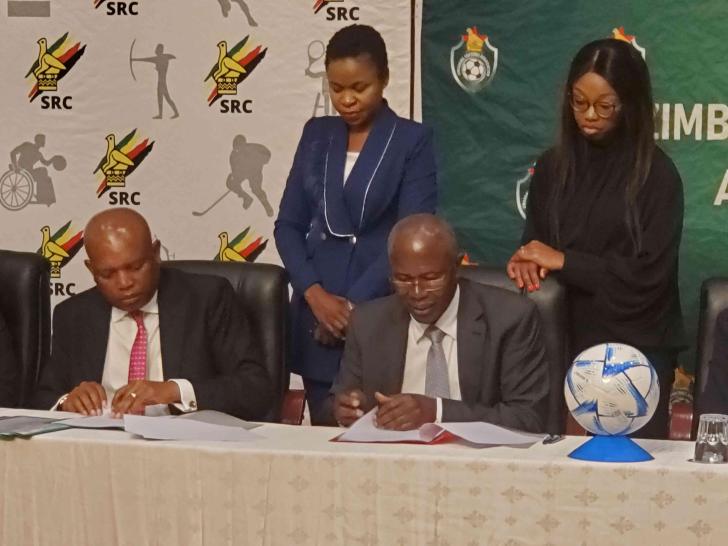News / National
SRC official exonerates ousted ZIFA board members facing fraud
23 Oct 2024 at 10:30hrs |
0 Views

A Sports and Recreation Commission (SRC) official has made significant concessions during the trial of five former Zimbabwe Football Association (ZIFA) board members charged with fraud, potentially influencing the outcome of the case. The accused - Felton Kamambo, Philemon Machana, Stanley Chapeta, Joseph Mamutse, and Brighton Malandule - were arrested after the SRC alleged they used ZIFA letterhead to write misleading letters while under suspension.
Midway through the trial, the SRC opted out of the case, informing the Prosecutor-General that they no longer wished to be considered complainants. Despite this, the state continued with the prosecution, prompting the five accused to seek a referral to the Constitutional Court, arguing that the state should not proceed without a complainant.
On Tuesday, Sebastian Garikai, the former acting director general of the SRC, testified that writing letters on ZIFA letterhead violated the terms of the suspension imposed on the accused, which barred them from acting as ZIFA officials. He stated that Mamutse had authored the letters on behalf of the ZIFA board, thereby implicating all individuals involved.
Prosecutor Oscar Madhume questioned Garikai about the connection between the accused, asking, "If the letters were signed by accused four (Mamutse), how are the others linked?" Garikai clarified that the letters were explicitly written on behalf of the ZIFA board, establishing a connection between the accused and the alleged offense.
However, as the prosecution continued its line of questioning, Garikai acknowledged a crucial oversight: the suspension letter issued to the former board members did not specify prohibitions, including the use of ZIFA letterhead. When asked whether the conditions of suspension were communicated directly to the accused, Garikai conceded that the suspension letter lacked specific terms.
Furthermore, Garikai admitted that the SRC had not verified whether the five actually wrote, signed, and sent the letters to various ZIFA officials, relying instead on accounts from Xolisani Gwesela and other ZIFA officers in their police report. This point was challenged by Admire Rubaya, the lawyer representing the former board members, who argued that without verification from a handwriting expert, Garikai could not substantiate the allegations based solely on Gwesela's testimony, which Rubaya suggested was influenced by personal motives related to Mamutse's position.
Garikai also conceded that he did not consult with the five before making the police report. Additionally, he revealed that despite the suspension of the former ZIFA board members, FIFA rejected the SRC's actions and subsequently banned Zimbabwe from all international football activities. This development bolstered the defense's argument that there was never a valid suspension, as FIFA continued to engage with the board members during the SRC's allegations.
In a critical admission, Garikai acknowledged that at the time the accused were alleged to have misrepresented themselves, they were recognized as the legitimate football leaders in Zimbabwe due to FIFA's suspension of the country. The defense further contended that Mamutse's suspension was irregular since he was not a board member but rather a ZIFA employee under a private contract according to the association's constitution.
The case is set to continue on October 31, with these recent developments raising questions about the strength of the prosecution's case and the potential for a shift in its direction.
Midway through the trial, the SRC opted out of the case, informing the Prosecutor-General that they no longer wished to be considered complainants. Despite this, the state continued with the prosecution, prompting the five accused to seek a referral to the Constitutional Court, arguing that the state should not proceed without a complainant.
On Tuesday, Sebastian Garikai, the former acting director general of the SRC, testified that writing letters on ZIFA letterhead violated the terms of the suspension imposed on the accused, which barred them from acting as ZIFA officials. He stated that Mamutse had authored the letters on behalf of the ZIFA board, thereby implicating all individuals involved.
Prosecutor Oscar Madhume questioned Garikai about the connection between the accused, asking, "If the letters were signed by accused four (Mamutse), how are the others linked?" Garikai clarified that the letters were explicitly written on behalf of the ZIFA board, establishing a connection between the accused and the alleged offense.
Furthermore, Garikai admitted that the SRC had not verified whether the five actually wrote, signed, and sent the letters to various ZIFA officials, relying instead on accounts from Xolisani Gwesela and other ZIFA officers in their police report. This point was challenged by Admire Rubaya, the lawyer representing the former board members, who argued that without verification from a handwriting expert, Garikai could not substantiate the allegations based solely on Gwesela's testimony, which Rubaya suggested was influenced by personal motives related to Mamutse's position.
Garikai also conceded that he did not consult with the five before making the police report. Additionally, he revealed that despite the suspension of the former ZIFA board members, FIFA rejected the SRC's actions and subsequently banned Zimbabwe from all international football activities. This development bolstered the defense's argument that there was never a valid suspension, as FIFA continued to engage with the board members during the SRC's allegations.
In a critical admission, Garikai acknowledged that at the time the accused were alleged to have misrepresented themselves, they were recognized as the legitimate football leaders in Zimbabwe due to FIFA's suspension of the country. The defense further contended that Mamutse's suspension was irregular since he was not a board member but rather a ZIFA employee under a private contract according to the association's constitution.
The case is set to continue on October 31, with these recent developments raising questions about the strength of the prosecution's case and the potential for a shift in its direction.
Source - zimlive
Join the discussion
Loading comments…



























